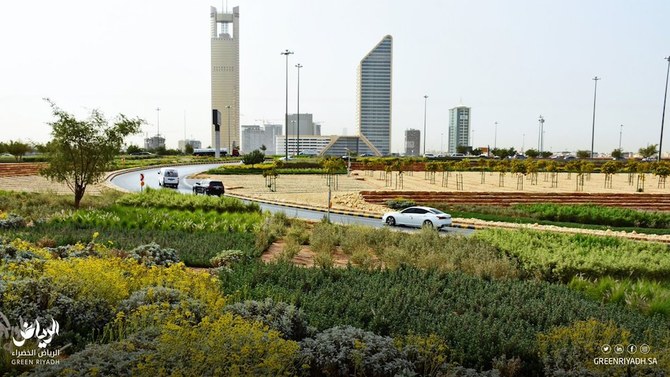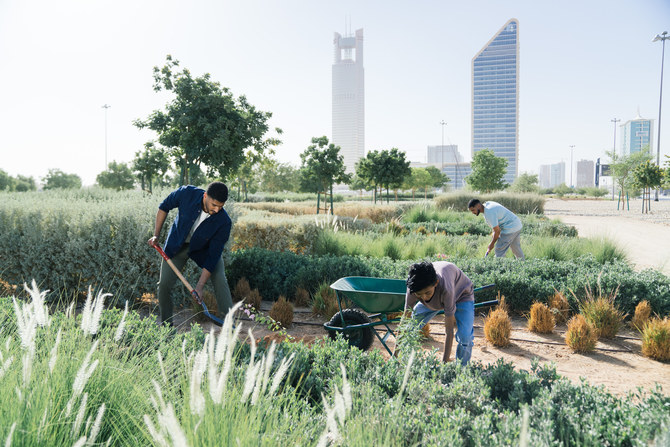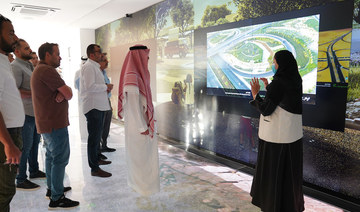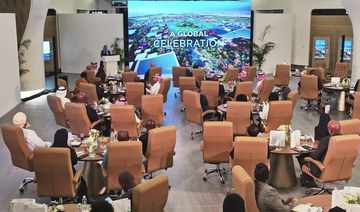JEDDAH: For decades, traditional urban planning approaches were applied in major cities across the world, resulting in sprawling forests of concrete devoid of adequate greenery. Riyadh, the Saudi capital, was no exception.
That is why the Green Riyadh Project was launched in 2019 to transform the city into a more sustainable and livable metropolis, by increasing total green space from 1.5 percent to 9 percent and planting some 7.5 million trees, irrigated with recycled water.
By 2030, project developers plan to have greenified some 120 neighborhoods, covered more than 1,000 km of main roads in greenery, and to have developed more than 40 city parks.
Already, one cannot visit Riyadh without noticing the abundance of greenery, with millions of trees having been planted and new parks and green spaces sprouting up all over the city.
The project is having a positive impact on the environment in a city where summer temperatures can rise as high as 55 C.
Extra green spaces are helping to reduce air pollution and mitigate the effects of climate change by reducing average air temperatures in urban areas by 2 C and surface temperatures by up to 15 C.
In addition to its environmental benefits, the urban greening project is also improving the quality of life for Riyadh’s residents, providing much-needed areas for recreation and relaxation, while also helping to reduce noise pollution and heat-island effects.
“With a city that has rapidly grown horizontally for years, it is becoming costly — physically, financially and environmentally — to move around,” Shahad Manea, an urban designer based in Riyadh, told Arab News.
“Green spaces are engines to encourage vertical expansion, making cities more efficient, dense and convenient. This in turn establishes and increases public reliance on the cheapest and healthiest mode of transit — walking.
“Walkable cities are not only healthier but also more human, as the pace becomes slower, interactions become more frequent, encouraging dialogue, strengthening communities and improving quality of life.”
As with other cities around the globe, Riyadh has not escaped the twin pressures of population growth, expected to reach 15 to 20 million by 2030, and hotter summers.
Rising temperatures lead to greater demand for air conditioning, which in turn pushes up energy consumption, jacking up the burning of fossil fuels, increasing pollutants in the air, and contributing to even higher temperatures.
“Looking at the long-term gains, green spaces contribute to the reduction of greenhouse gas effects,” said Manea.
“This does not only reduce environmental pollution and ozone threats but also causes temperatures to decline, strong winds to break down, helps minimize sun exposure and dryness, reduces the impact of sandstorms, and regulates CO2 levels.
“This in turn will reduce cooling and irrigation costs, the over-reliance on private transit and its gas consumption.”
One innovative way to maximize green spaces in urban areas is to transform rooftops and other exterior structures like bus shelters into gardens, which can help reduce interior temperatures and collect rainwater — particularly during heavy downpours.
“These roofs and other green areas are great spaces for rainwater collection while minimizing runoff overflowing the streets, which causes costly damage annually,” Manea added.
Indeed, in order for a greening project of this scale to remain sustainable in Saudi Arabia’s desert climate, planners have made water conservation and reuse a top priority.
The city intends to improve its current usage of treated water for irrigation purposes from 11 percent to 100 percent, increase the amount of treated water used for irrigation from 90,000 cubic meters to a million by 2030, and to plant native species that can withstand the dry climate.
About 72 native shade-plant species compatible with Riyadh’s environment will be used for the project.
These include trees and shrubs such as the Acacia nilotica, also known as the gum arabic tree, and other species from the same family, Ziziphus spina-christi, known locally as Al-Sidr, wattle, hollyhock, queen’s wreath, and neem tree.
“Green spaces are always relevant, useful, timeless, and never fall out of style,” said Manea.
“However, to future-proof these spaces, the sole use of native plants should be implemented to make sure these places remain in good condition as these species self-sustain, prevent local ecosystems from going extinct and require minimal irrigation and maintenance.
“The use of native species reduces the chances of infrastructure complications when functions of the green space shift. Additionally, large green spaces should be constructed with differentiation in mind.
“Adaptable spaces are differentiated, meaning they are not rigid and defined enough, which makes them flexible to have room for future functions, public interpretations, and technological advances.”
Once its aims are achieved, the Green Riyadh Project will be a milestone that contributes to fulfilling a key goal of the Saudi Vision 2030 plan to promote the capital’s position among the world’s top 100 most livable cities.





































